‘Our only Aim Is to Go Home’: Rohingya Refugees Face Stark Choice
ASIA-UPDATES ON MYANMAR ROHINGYA GENOCIDE, 11 Nov 2019
Sarah Marsh and Redwan Ahmed – The Guardian
With citizenship in Myanmar still denied, Rohingya refugees in Bangladesh must either live under severe restrictions or move to an isolated island.
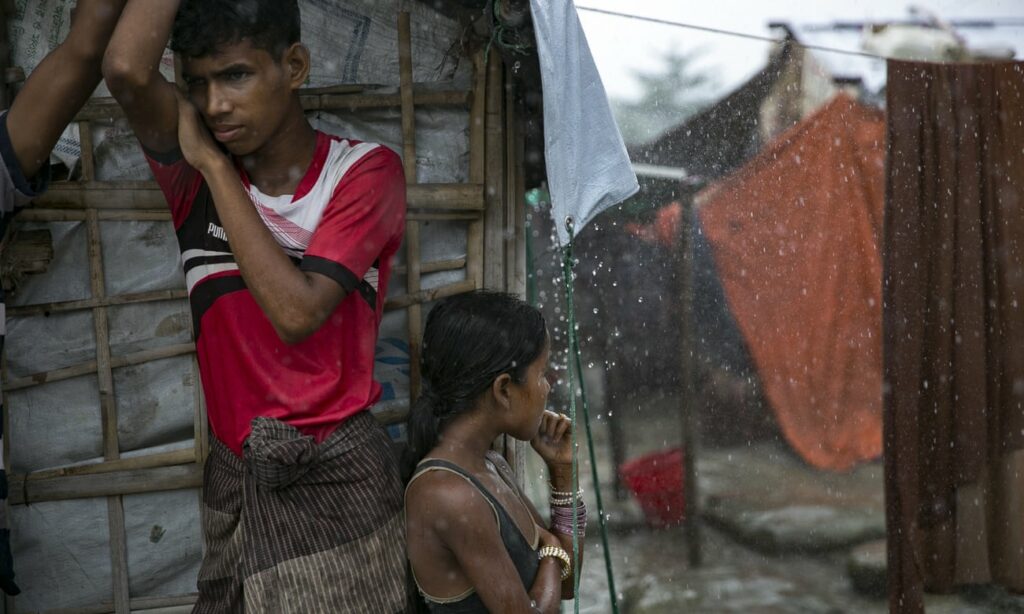
Rohingya refugees who fled Myanmar to Bangladesh fear returning without citizenship rights. Photograph: Allison Joyce/Getty Images
4 Nov 2019 – Life in the world’s largest refugee camp has grown harder in the past few months. Mohammad, a Rohingya farmer who lost his leg fleeing violence in Myanmar, does not understand why.
“We got a lot more before in terms of food and help, but now it feels like we are not getting enough support from the government and NGOs. We are also more restricted in our movement,” he says, sitting on a bench outside his house, surrounded by discarded plastic bottles and rotting food.
The Bangladeshi government has launched a crackdown in the camp, shutting shops run by refugees, blocking internet services, confiscating mobile phones, putting up fencing and setting an 8pm curfew, meaning people can’t leave their homes at night.
Bangladesh appears to be getting frustrated with its more than 1 million guests. Politics is turning and it has been reported that locals in Cox’s Bazar are running out of patience. The government is finalising plans to move 100,000 refugees to an island in the Bay of Bengal and refugees wonder if it is all connected.
The state minister of foreign affairs, Shahriar Alam, said fencing was being put up for security reasons. “As far as the internet is concerned, 2G is still available. Due to the credible security concerns, [the] government has kept the internet access limited,” he says.
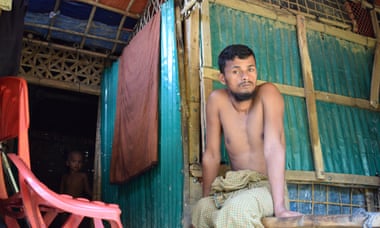
The limited mobile phone access in the camp means Mohammad is unable to contact his relatives. Photograph: Sarah Marsh/The Guardian
For Mohammad, the internet ban means that he has been unable to contact relatives in Malaysia and Saudi Arabia. “I feel frustrated by it. Not just about being unable to contact people overseas, but I also cannot call my neighbours. If they are at the market I cannot say, for example: ‘Please bring me back something.’”
Along the dusty road running down the middle of the camp, a number of shops selling food, clothes and other items were shut by police in recent weeks. Their entrances are covered in green and blue tin shutters, and the wooden benches outside lie empty.
Wasi Rahman, 20, a Rohingya vendor, does not understand why his clothes shop has been shut. “The police came and closed it,” he says, adding that he used to make about 4,000 taka (£37) a day.
Abdullah, 30, had a chicken shop a few huts down that has also been shut. “The chickens are dying in my shop because I have to keep the door shut and it is hot in there … I have already lost 10 of them,” he says.
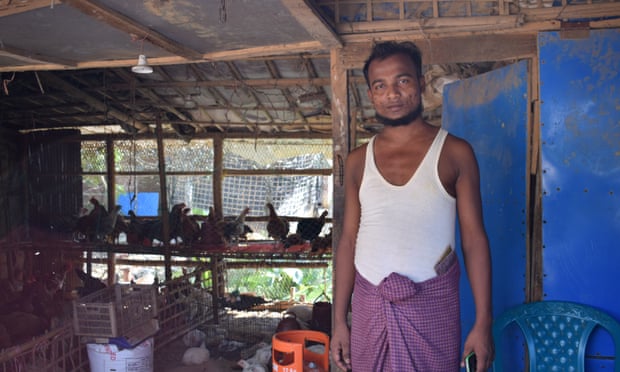
Abdullah’s chicken shop was closed by police. He has not been given a reason.
Photograph: Sarah Marsh/The Guardian
“We have not been given a reason as to why this is happening. We were just told it is, until further orders are given.”
NGOs working in the area were issued a statement from the government last month saying they should not hire Rohingya refugees. They have been using them as volunteers in camps, with those who help receiving a stipend for casual work as porters, night guards and labourers for construction work.
“The most obviously bad part of this is that it is cutting off these people’s only legitimate source of income. The only other option for them is selling aid but they are not allowed to do that either. It puts up logistical issues for the aid community as they use the Rohingya,” says a diplomatic source.
An anonymous aid worker says the question of Rohingya working and getting employment in camp has always been a “grey area”.
The crackdown comes as the government tries to relocate thousands of refugees to the silt island of Bhasan Char in the estuary of Bangladesh’s Meghna river, accessible only by boat.
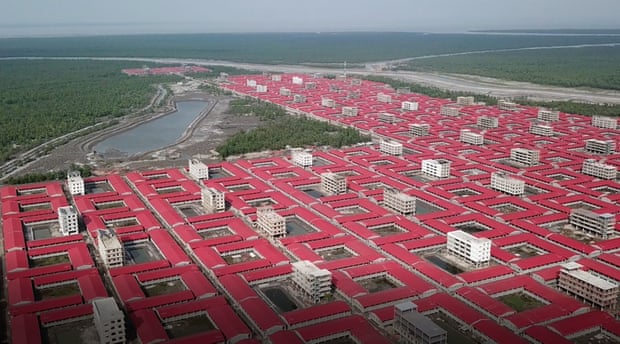
Bhasan Char is three hours from the mainland and prone to severe cyclones.
Photograph: Mukta Dinwiddie Maclaren Architects/AFP
The proposal has concerned human rights groups and NGOs, who are particularly worried about the island’s isolation – it is prone to severe flooding and cyclones, and is more than three hours by boat from the mainland.
The state minister for disaster management and relief, Enamur Rahman, says 3,500 refugees have signed up to go and, if aid agencies give their consent and Rohingya leaders agree, then they will make a final decision to move people. He notes this would probably be in the middle of November. “I have been told a lot are expressing a desire to go,” he says.
“She is scared because it is in the middle of the ocean and goes under water–she thinks she might drown.”
— Mohammed Saber, Rohingya farmer
At the camp, rumour has swirled in recent days that aid will be cut off and conditions will get worse, so it is better to sign up for relocation to Bhasan Char.
A majhi – a camp leader – who asked not to give his name for fear of repercussions, claims officials said at a recent meeting that there will be less aid in the future. Rohingya families were told they would be better off in Bhasan Char, where there was security and health facilities.
“A lot of people don’t want to go. In that meeting, 22 families said they were willing to go, but no one from my block,” he says.
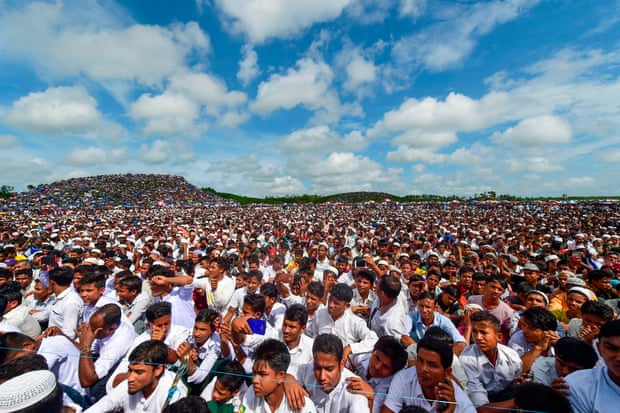
Rohingya refugees gather to mark the second anniversary of their exodus from Myanmar. Photograph: Munir Uz Zaman/AFP
But the restrictions in the camp have already put some people off staying. Mohammed Saber, 36, a Rohingya farmer, is keen to move.
As he sits in the darkness of his hut, light sneaking through the bamboo slats, he explains that he lost three of his brothers in the violence in Myanmar. He misses his former life, waking up at 5.30am for prayer and then tending to his cattle. His childhood was spent visiting local markets with his father, buying sugar cane.
“Living in the camp is becoming harder as they are tightening restrictions. I don’t feel like we are getting enough support and I hope to be freer on Bhasan Char,” he says. “I saw on the news that there are buildings and solar panels there.”
As he speaks, his wife Fatima pokes her head from behind the door of a dark room, shouting: “I do not want to go!”
Mohammed explains: “She is scared because it is in the middle of the ocean and goes under water from time to time. She thinks she might drown.”
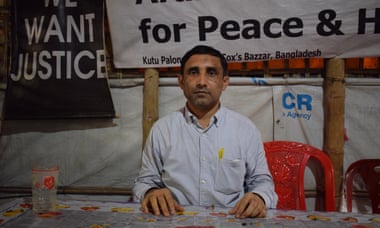
Mohib Ullah thinks tightened government restrictions may be down to drug gangs operating in the camp.
Photograph: Redwan Ahmed/The Guardian
Mohib Ullah, chairman of the Arakan Rohingya Society for Peace and Human Rights – who represented his community when he met Donald Trump in the White House earlier this year – says poor conditions in the camp won’t make people move to Bhasan Char, and he doesn’t think that is the authorities’ aim.
He puts the heavy-handed approach of government officials down to drug gangs operating in the camps. “Many criminal groups inside the camps are getting organised and controlling the drug markets with mobile phones. The government has a hard time facing it. I don’t know why more restrictions are in place, but I think that’s why.”
It comes following the fatal shooting of two Rohingya refugees by Bangladeshi police during a gunfight in a refugee camp after they were accused of killing a ruling party official.
One consequence of the crackdown, according to Ullah, is fewer passes being issued to people who need to go outside the camps for hospital treatment. Ullah has diabetes and says that he has been feeling unwell.
“Because I have diabetes, there are longer-term consequences [of not getting proper treatment]. It can affect my kidneys and eyes. I have been feeling unwell for a few days. I got medication from Médecins Sans Frontières and hope to get a proper checkup soon,” he says.
Ullah was involved in the recent gathering for the second anniversary of the exodus from Myanmar, which upset some locals. Since then, he and other leaders have fallen under tight scrutiny from the police, with plain-clothes officers keeping guard at his residence.
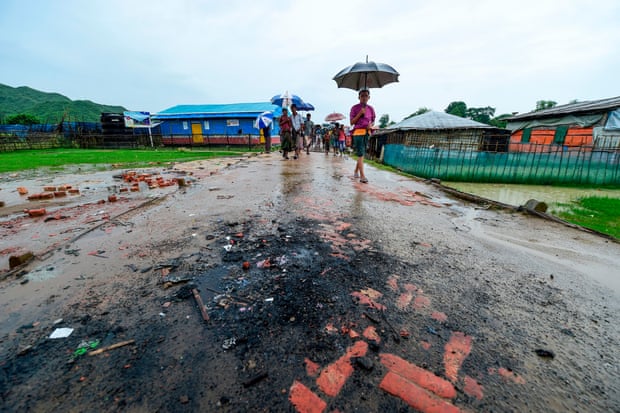
Clashes between Bangladeshi locals and Rohingya refugees have resulted in shops being burned. Photograph: Munir Uz Zaman/AFP/Getty Images
There have also been a number of reports in local press stoking tensions between Bangladeshi locals and Rohingya refugees. One paper published a photo of tools for an NGO farming project, suggesting that refugees were being given weapons. Ullah also says his speech at a gathering was wrongly quoted in the media.
“‘We want to go back [to Myanmar]’, is what I said, but the media reported it as me saying I did not want to go back,” he says.
During the interview with Ullah, two Bangladeshi plain-clothed police officers walk in, and the Rohingya leader says he has to go. The tense atmosphere after their arrival seems representative of a wider mood in the camp, with fear and uncertainty growing daily.
“Our only aim is to go home,” Ullah says. “We don’t want anything more than that.”
Go to Original – theguardian.com
Tags: Activism, Asia, Asia and the Pacific, Buddhism, Burma/Myanmar, Conflict, Ethnic Cleansing, Genocide, Geopolitics, History, Human Rights, Humanitarianism, Indigenous Rights, Justice, Maung Zarni, Military, Power, Racism, Religion, Reviews, Rohingya, Social justice, Solutions, United Nations, Violence, Violent conflict, War
DISCLAIMER: The statements, views and opinions expressed in pieces republished here are solely those of the authors and do not necessarily represent those of TMS. In accordance with title 17 U.S.C. section 107, this material is distributed without profit to those who have expressed a prior interest in receiving the included information for research and educational purposes. TMS has no affiliation whatsoever with the originator of this article nor is TMS endorsed or sponsored by the originator. “GO TO ORIGINAL” links are provided as a convenience to our readers and allow for verification of authenticity. However, as originating pages are often updated by their originating host sites, the versions posted may not match the versions our readers view when clicking the “GO TO ORIGINAL” links. This site contains copyrighted material the use of which has not always been specifically authorized by the copyright owner. We are making such material available in our efforts to advance understanding of environmental, political, human rights, economic, democracy, scientific, and social justice issues, etc. We believe this constitutes a ‘fair use’ of any such copyrighted material as provided for in section 107 of the US Copyright Law. In accordance with Title 17 U.S.C. Section 107, the material on this site is distributed without profit to those who have expressed a prior interest in receiving the included information for research and educational purposes. For more information go to: http://www.law.cornell.edu/uscode/17/107.shtml. If you wish to use copyrighted material from this site for purposes of your own that go beyond ‘fair use’, you must obtain permission from the copyright owner.
Read more
Click here to go to the current weekly digest or pick another article:
ASIA-UPDATES ON MYANMAR ROHINGYA GENOCIDE: